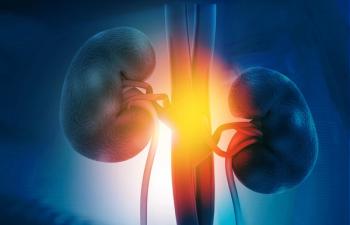
Metabolic Factors Linked to Treatment Resistance in Renal Cell Carcinoma
Studies have demonstrated that renal cell carcinoma (RCC) positive for PD-L1 is more likely to respond to PD-1 pathway blockers compared to those patients who are negative for PD-L1.
Studies have demonstrated that renal cell carcinoma (RCC) positive for PD-L1 is more likely to respond to PD-1 pathway blockers compared to those patients who are negative for PD-L1. However, not all PD-L1–positive RCC tumors respond to immunotherapy treatments. Now, researchers think they may know why.
Investigators are
The new findings may point the way toward potential new targets for combination therapy regimens with anti–PD-1. In this current study, the researchers found that renal cell carcinomas positive for the protein PD-L1 from patients who did not respond to treatment with the anti–PD-1 therapeutic nivolumab (Opdivo) had significantly higher expression of genes associated with metabolism when compared with PD-L1–positive tumors from patients who did respond to nivolumab.
“If these data are reproduced in larger groups of patients, we could potentially use the information to guide treatment decisions for patients with renal cell carcinoma,” said study investigator Suzanne Topalian, MD, professor of surgery and oncology at the Johns Hopkins University School of Medicine, Baltimore, in an American Association for Cancer Research (AACR)
Dr. Topalian and colleagues analyzed archived pretreatment tumor samples from 13 patients with metastatic RCC positive for PD-L1 who had gone on to receive nivolumab through clinical trials. Four of these patients were classified as having responded to nivolumab treatment and nine were classified as having not responded.
Whole-genome expression profiling that included 29,377 genes identified significantly elevated levels of 110 genes in tumors from nonresponding patients. Further analysis showed that genes expressed at elevated levels in tumors from nonresponding patients were predominantly associated with metabolism. These genes were also found to be expressed in cultured kidney cancer cells.
The researchers reported that the expression of genes involved in metabolic and solute transport functions, such as UGT1A family members, was associated with treatment failure in patients with PD-L1-positive RCC. The researchers found that tumors from patients who had responded to nivolumab therapy overexpressed specific immune markers such as BACH2, a regulator of CD4-positive T-cell differentiation.
Dr. Topalian and her team are planning to extend their studies and analyze other types of cancer in attempt to confirm the current results. She noted that this study was limited due to that it’s retrospective nature and only included a small number of patients.
Newsletter
Stay up to date on recent advances in the multidisciplinary approach to cancer.














































